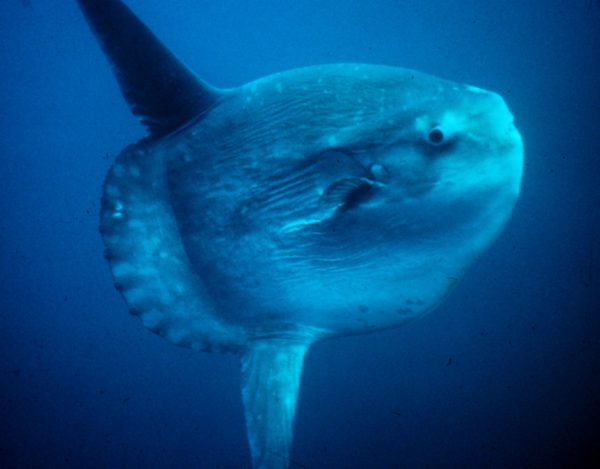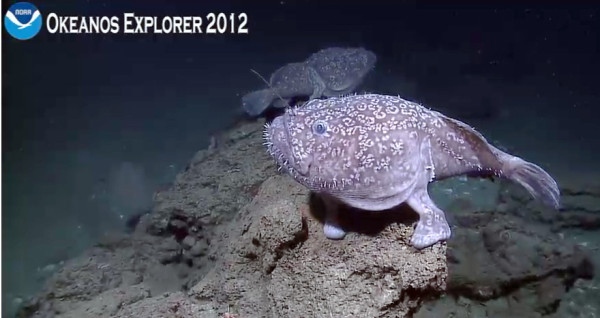Recently a couple of interesting posts sparked some introspection on how I view, label, and discuss the denizens of the oceans. Carla Litchfield, Senior Lecturer, School of Psychology, Social Work and Social Policy, at the University of South Australia, penned a recent piece titled “Calling deep sea species ‘monsters’ may harm their conservation.”
While this misconception or inaccuracy may seem harmless, it could pose problems for future conservation efforts, as people are more likely to support conservation of cute rather than creepy-looking animals. While the angler fish is easily turned into a scary monster, the similar-sized tiny Pac-Man looking octopus is cute and popular with the public…If images are posted on social media by laypeople in a way that appears sensational and even heartless, and without any accurate information about the animals, then there is no resulting respect for these sea creatures or educational value. Simply viewing these creatures as freaks, ignores the importance of their role in keeping our oceans healthy.
 More recently, DSN republished a very tongue-and-cheek rant about the uselessness of ocean sunfish. This drew criticism in the comments. “We are in no position to dis other species.” “Agree with…other pelagic researchers…molas are awesome, fast, predators that given their numbers and chosen prey must play an integral role in the open ocean ecosystem. Please stop spreading this rant.” Let’s not also forget the post where we railed against the cute, cuddly view of dolphins and received a backlash of comments.
More recently, DSN republished a very tongue-and-cheek rant about the uselessness of ocean sunfish. This drew criticism in the comments. “We are in no position to dis other species.” “Agree with…other pelagic researchers…molas are awesome, fast, predators that given their numbers and chosen prey must play an integral role in the open ocean ecosystem. Please stop spreading this rant.” Let’s not also forget the post where we railed against the cute, cuddly view of dolphins and received a backlash of comments.
So first thing is for everybody to take a breath and stop taking yourselves so damn seriously.

Nobody is going to protect and conserve what they do not know or understand. These pieces use a whimsical and creative writing style and informal tone to draw the audiences in. Quite simply these posts draw views, far more than other kinds of posts here at DSN. The reason? Because we tap into the human curiosity of the natural world and instill a sense of awe. Or maybe because most people have a sense of humor and like science with a helping of laughter. Humor, ick factor, bizarreness, oddities, and challenging the way we think about species allows us to deliver knowledge. How many people actually knew about ocean sunfish before the viral rant?
More than once over the years DSN has been criticized for being “too informal”, “not being serious enough about science”, and by far my favorite to date “tarting up science.”
This “oh-so-hip” presentation of a very interesting phenomenon is regrettable. I stopped reading halway [sic] through it as I couldn’t take any more. Just present the science. Tarting it up for people to read is pointless. Such readers have no value. Too bad, I would have liked to learn the real scinece [sic] presented here.
I CAN NOT DISAGREE MORE WITH THESE COMMENTERS. Our “tarting it up” is and will remain a core value for DSN. We will continue to work diligently to make science accessible, relevant, current, and of course fun. Now more than ever. You know what happens to science writing that is not engaging? Nobody engages with it. Quite frankly, the old way of dry science communication and being serious about science did not work. Science communication occurred within echo chamber and we all patted ourselves on the back for a job well done. Now, look where we are at. We need new methods engaging new audiences—those audiences that some think have no value. For Pete’s sake, let’s lighten up and get sense of humor.

More than once here at DSN, we have referred to ocean organisms as monsters. From parasitic crustaceans to colossal squids, we have playfully applied the monster moniker. Quite frankly, I believe it is completely acceptable to call deep-sea species monsters, freaks, and oddities. Anything else would not acknowledge how other worldly, bizarre, fascinating, unique, and, indeed, special these deep-sea species actually are. That otherness reflects a fascinating evolutionary trajectory these organisms to adapt to the environmental extremes of the deep sea. They are nothing short of beautiful monsters full of adaptive solutions to the most unique place on earth. If Monster’s Inc., Where the Wild Things Are, and Cookie Monster taught us anything is that monster’s are lovable and beautiful.
By the way did you know the spinal column of M. mola contains fewer vertebrae and is shorter in relation to the body than that of any other fish. That’s weird. Why and how did that happen? Which brings me to my next point. When we acknowledge oddity, everyone’s natural next questions are why and how? That’s a good thing…opening the door for some amazing science communication. To borrow from the ever articulate Jamie Vernon, “Curiosity expands our worldview.” This weirdness inspires awe and instead of harming them may ultimately lead to their protection.
There is also nothing wrong with acknowledging that some animals suck. Evolution does not create perfect animals. Evolution creates just good enough animals. Anything changes—environment, competitors, predators—those species become not so good. The history of life on Earth is riddled with story of story of species that just could not cut it; over five billion in fact or more than 99% of all species are now extinct. The Mola mola, or the ocean sunfish, in many regards is a ridiculous animal with some very peculiar behaviors and evolutionarily good enough. Of course, I love ocean sunfish because of these. Also take pandas. They kind of suck at being a species.
Female pandas can expect a solid 16 years of fertility, but they only ovulate once a year, and can only handle one set of offspring every two years. There’s no clearer recipe for extinction.
In 1940, geneticist Richard Goldschmidt suggested that new species may arise not by gradual change but by macromutations. Of course, these major mutational changes may be disastrous and fatal. He called these monsters. But in very rare circumstances, one of these macromutations, by shear dumb luck, may produce a very well adapted animal ready to exploit a completely new way of life. His term of these? Hopeful monsters.
I choose to embrace those hopeful monsters for their oddity, their differences, and sometimes even their suckiness.
Share the post "So yeah ocean sunfish are ridiculous, dolphins are @#$@&, and deep-sea anglerfish are monsters"






We of Southern Fried Science will gladly die on this hill with you.
The lead-wit-cute argument is demonstrably false. Overfishing of long live, low fecundity deep-sea species is among their greatest threats. What’s the very first thing we do to guarantee their demise? Rebrand them as something cute. Perhaps slimeheads, toothfish, and sea devils would be doing a bit better if they didn’t show up on the menu as orange roughy, sea bass, and monkfish.
Monsters live in our dreams. Sanitized cutesy fish die on our plates.
As someone who will happily read dry scientific papers AND who found that tongue-in-cheek rant about molas funny, please keep on doing exactly what you’re doing. The ocean is great in part because it’s full of so many creatures that seem incredibly weird at first glance. Their weirdness makes them special and cool! And humor is fun to read.
I very much like the way you cover content for exactly the reasons you give. I have frequently sent articles written here to friends less interested in sea life than I am resulting in increased enthusiasm on their part. Keep it up.
I’ve been reading you for years, and god, I’m just so happy I found you. Your articles are a complete delight in so many ways. Please keep up the wonderful work, folks.
Pandas would’ve probably died without human help (and squintillions of dollars) anyway.
And those cute koalas frequently die of starvation once their non-replaceable teeth wear down too much from eating their less than nutritious leaf diet. Perfect evolutionary design? Not. Even.
(And dolphins are the rapists of the sea, screw that rosy idea of their supposed intelligent nobility. They’re frat boys with flippers.)
I’ve noticed that tendency too actually. The one where people seem to just want the dry, scientific facts in divulgation books or websites. I don’t really get it honestly. Even in college it’s not all dry facts and the idea of a whole taxonomic without jokes about how ugly or cute the organism is or conservation without jokes (and discussions) of the uselessness of pandas and other animals (in a ‘it won’t adapt should we let it go extinct?’). Also isn’t the whole idea of scientific communication to get the public more interested the whole point of these types of books and websites? A dull article won’t get as much attention that’s for sure.
I do think that lumping the first article about calling deep sea creatures monsters and the possible implications in with comments and rants left on your website is unfair. Dr. Litchfield, who wrote that piece, is trying to make an interesting point. Whether you agree with it or not (and I’m getting you don’t even want to think about it), it’s not an internet rant. As a historian of marine biology, I study the way that the public thinks about the marine realm and how presentations of that space influence conservation and science. And yes, there is a possibility that labeling something “alien” or “monstrous” has an impact on how interested people are in preserving it. The answer to this claim is not to freak out and overreact by calling everyone a bunch of whiners, but instead to think about when this might be true and when it might not be. Calling dolphins names or even sunfish isn’t a problem- both of those posts are hilarious. And truthfully, I feel similarly about manatees (they suck at swimming- just learn to swim!). But, sometimes labeling something “alien” and “unknowable” can have an impact on how willing people are to fund research or to protect places. If something is so alien it doesn’t impact our lives or we can’t imagine its importance, it doesn’t matter except as an oddity. The concern is, when do we know when that impact is happening- how can we know how we are shaping perceptions of the sea and how do we work on it? I’m a huge fan of this website, but this post was overly critical of what Dr. Lichtfield was trying to say. Go after your critics in your comments section-that’s cool- but she wasn’t saying don’t make fun of sun fish or call things cool, and I certainly don’t think she was talking straight to this blog. Yes, you educate people on the ocean and that is important. But it is also important to understand that sometimes, attempts at education do not always go as planned. This is why we are academics. So we can learn continuously.
At least brandings of any type bring peoples attention to these bizarre and beautiful beasts.
Anyway, I am quite sure you have the page views to slap in the face of the naysayers. There is room for all these types of communication, the more morphs the wider the reach. I’m not sure why people bother telling you when they haven’t read all the way through – they were clearly not the target audience in the first place.
I echo the calls to “Keep it up!” Dr M and Deep Sea News – you have plenty of supporters clamoring for your deep sea wit and wisdom.
One of my students recently posted online that the one single thing they will remember from their zoology degree is the video I showed in class of marine flatworms penis fencing. This was reposted so much that thousands of people now know flatworms exist, and are quirky hermaphrodite lovers. Same thing with cone snails eating live fish and being the coolest most venomous animals ever. When else do gastropod molluscs impress so many young people? Gotta entertain as well as educate, spark that debate among the people who only hear about animals second hand via the internet!
I second this sentiment
Dry science has its place, but insisting upon it as the one and only true way is nothing but harmful. It’s the fastest way to kill people’s fascination with the natural world, and I’m sure it’s a barrier to entry for many people who’d otherwise totally love science!
The world around us is weird and wonderful and beautiful, and if you refuse to acknowledge that, you’re probably taking yourself too seriously.
Good for you. I’m pretty offended at people targetting an organisation specifically aimed at education about (and thus demystification and interest in) poorly known animals for not *doing it right*. Sure, people make mistakes and that’s cool, but this sanctimonious bullshit really gets up my nose.
As for “such readers have no value”, that is the most pathetic thing I’ve read in a while. (a) Actually, ‘those’ readers are the most important, you idiot. By which I mean people who don’t necessarily have an intrinsic interest in ecology or biodiversity. (b) Lots of scientists, including myself, really enjoy this. I mean, obviously: this is written by scientists! I really hope the person who wrote this is still in undergrad or fresh out of school, because that’s a ridiculous, embarrassing, and gross thing to think. (c) I also enjoy more “dry” reading, and that in no way precludes being exceptionally amused by this kind of thing. My first reaction was “hey! Leave mola mola alone!” followed by dying of laughter, FYI. And sharing it on FB.
I disagree. Pandas survived just fine until humans arrived; we are their only problem. And as of dolphins, I’m sure that, if proper research was undertaken, we’d find out that the prevalence of rape between dolphins is pretty similar to that within heavily patriarchal human societies. They aren’t more the rapists of the sea than humans are the rapists of the land.
I also believe that we’re witnessing fairly recent phenomena as the dolphin’s natural aggression is being heavily exacerbated by the noise pollution generated by human ships.
I was among those who complained about the sunfish roast and it looks like I’ll be in the minority with this comment, too. So be it, this needs to be said.
I greatly appreciate most of DSN’s posts and articles. I learn from them and am often entertained by them. I appreciate the interest in marine life that they try to instill in the audience. Most importantly, though, I believe is to engender appreciation and respect for our fellow species and for nature. This can be done in a colorful, humorous way but should not be done at the subject’s expense. Just as one (hopefully) wouldn’t describe another culture in an insulting, derogatory way, we shouldn’t describe other species in that way. At the very least there should be some redeeming value in a commentary. There was none whatsoever in the sunfish screed.
It reminds me of the appalling video about the sunfish in Boston Harbor for which those two very vulgar and violent ignoramuses received so much fame and praise. They tortured that amazing and harmless fish, and people cheered them: https://www.facebook.com/mikeybrgn/videos/10200956162583724/ I was truly disgusted to find it posted here with no criticism from DSN but rather as something praiseworthy.
Bringing attention to other life forms is not enough. We should appreciate and respect them, and above all we should have compassion for our fellow sentient beings, whatever species they happen to be. To me, engendering this quality in others is DSN at its best. Encouraging disrespect for them is DSN at its worst.
I have zero problem with silly or irreverent or tartish, but I do think negativity can be mildly corrosive, even when it’s tongue-in-cheek.
Snark gets attention, and attention is better than no attention, sure. But why not make a point of using your influence — and often you do — routinely towards respect and amazement? Sure, amazement at the ridiculousness of the contraption that is life. But the crazy thing works. Laugh at that.
Negative attitudes probably matter. Shark conservation has had some trouble with attitudes. You could run a psych study presenting subjects with a bland article, an interesting positive one, or a catchy negative one.
I wouldn’t criticize, because I bet even your negative articles are net benefits for the species involved, but since you bring up the question, there it is. I have to agree with the comments that H. sapiens in particular in no position to dis M. mola as a species. They’ll outlast us. And let’s not talk about who’s getting into Heaven.
Perhaps not a rant but of similar vain in argument, Litchfield’s piece remains an opinion without data to support it. The piece was published online and thus comment is open on Litchfield’s contentions. This article is thus a valid commentary and part of the scientific process of vetting.
As noted above, we actually have solid data demonstrating that the “unmonstering” of fish species highly coincides with greater landings and consumption of these species.
And to the contrary, I have spent greater than a decade thinking precisely about these kinds of issues and collecting data from my social media campaigns on precisely what does and does not work.
As a far as labelling something alien, this likely leads to more funding in programs on exploration and uncovering mysteries of oceans.